Obama’s Europe Neglect Could Bring Bush Nostalgia
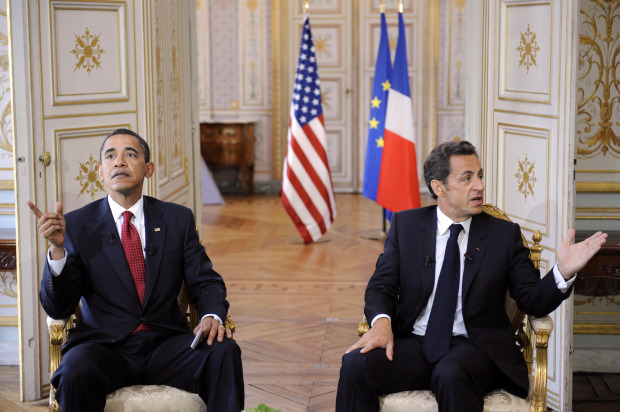 My first piece for ForeignPolicy.com, “Europe’s Obama Fatigue,” is online.
My first piece for ForeignPolicy.com, “Europe’s Obama Fatigue,” is online.
Despite George W. Bush’s defiant “you’re with us or you’re against us” public stance, he actively solicited advice and input from his NATO partners. Obama, by contrast, is saying all the right things in public about transatlantic relations and NATO but adopting a high-handed policy and paying little attention to Europe.
[…]
It would be ironic, indeed, if the Europeans started longing for the good old days of the Bush administration. But that nostalgia is closer than you might think.
Supporting arguments at the link.
UPDATE: As one might expect, this piece is generating some strong rebuttals.
Daniel Larison argues:
You cannot gauge the importance or unimportance of Europe to the United States on the largely cosmetic, superficial and procedural clashes Washington has had with various European states in the last nine months. Under the previous administration, Europe continued to be “important” to the U.S. even when major EU powers opposed administration policy in very public, dramatic ways. To the extent that Obama is losing ground with Europeans, he had far more goodwill and support to lose; in almost every European country, he continues to rate higher after the drop-off from unrealistic expectations than Bush did at almost any point. Obviously relations were and remained far more strained under the last administration than they have been so far under this one. We notice the minor clashes that have taken place because there was a widely-shared, unreasonable expectation that amity and concord with Europe would prevail under Obama.
[…]
European and especially German interests were flatly ignored by Bush when it came to handling Russia. Promises to Ukraine and Georgia of eventual membership in NATO were given over strenuous German opposition. Were European interests and opinions being heeded then? No. The missile defense ploy prompted Moscow to threaten abandoning its commitments under the European conventional forces treaty and elicited a great deal of bluster from Medvedev about targeting Russian missiles on European soil. Was European security strengthened by any of this? No. What matter then if Bush went through the motions and observed the right formalities when he was getting the major decisions wrong?
Most western European allies were not seriously consulted, nor were their objections given much weight, when the Bush administration decided to push ahead with the missile defense plan. In all of the new commentary claiming that Europe has soured on Obama, this seems not to count at all.
Judah Grunstein adds:
[I]f George W. Bush learned to listen to Europe, and in particular NATO, it was largely after he’d been chastened by the failure of the Iraq war and the 2006 mid-term elections. Up until his final NATO summit, Bush continued to talk loudly about the largely unpopular measures of NATO expansion and missile defense. He listened in the sense that he allowed the alliance — led by France and Germany — to turn him back, but it was out of weakness, not out of strength. There was no movement at all when it came to climate change, which is a major driver of public opinion here.
As for Obama’s handling of Europe, I’d agree with the characterization of his aloofness, especially with regard to the current Afghanistan strategic review. But while my sympathies would normally be with Europe on this sort of thing, I do think that Obama invited the NATO allies last April to assume greater ownership of the Afghanistan war. Given their refusal to do so, I don’t blame him for the freeze-out now. That said, Obama’s brush-off of the U.S.-EU summit is inexcusable and reflects a myopic view of the EU’s potential, especially with the advent of the Lisbon Treaty.
I actually don’t disagree with either Dan or Judah on most of these points and think some of the disagreement comes from the provocative title the FP folks chose. My argument is neither that the Europeans have tired of Obama or even that Bush was particularly adept at transatlantic diplomacy. Rather, it is that Bush cared more about Europe — and particularly the UK and New Europe — than Obama and therefore invested more of himself in the relationship.
It’s true that Obama’s stance on, for example, missile defense and NATO expansion is more popular in some quarters than Bush’s. Indeed, I prefer his approach on the latter and quibble with him on the former mostly on how the rollout was done vice the policy itself. But the policy differences are a reflection of Obama’s prioritizing Russia’s views over that of Europe, especially East and Central Europe. I think Bush was ultimately wrong in his zeal to bring Georgia and Ukraine into NATO but it was a policy preference motivated by the stated ideals of the Alliance of “a Europe whole and free.”

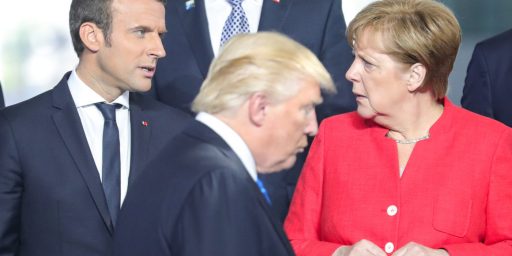
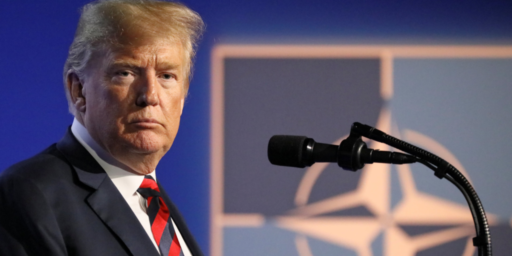
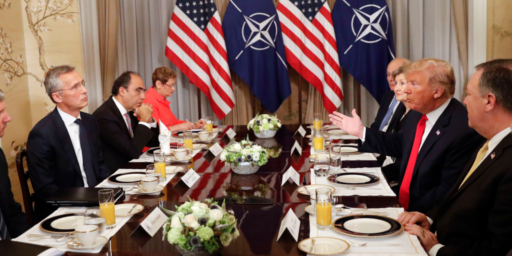

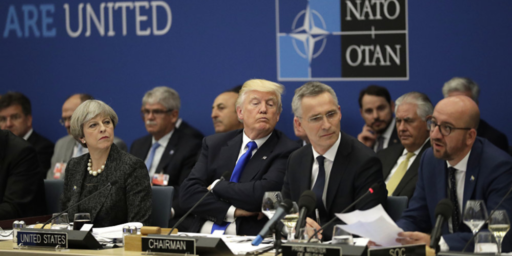
I am shocked, shocked I say. Our beloved President spent 20 years listening (or not) to a man preach distorted information about white Europeans. I believe our elected one had a relative involved in the Mau Mau movement in Kenya so his cold shoulder to the Brits would be understandable, after all Obama has done so much for his extended family. The Europeans better fall in line with what the One has to say or Rahn Emanuel will ???, What a punk!
I’m sorry but the article seemed pretty much like speculation and wishful thinking by the opposition rather than actual statements and concrete action from European sources.
Sure there have been mis-steps, but I think most European countries are at least somewhat forgiving of minor mistakes. That being said it is probably better to get this thesis into the conversation early before real diplomatic blunders occur.
Nice piece. I think that maybe the Euros hoped for a patsy, but they are getting someone who is still being advised by Gates and Jones, two of our best defense minds in recent history. I think we will see some more tensions as there is no easy answer in Afghanistan. Everyone’s economy is hurting and settling in for 20 years of war is gonna be costly.
Any chance you could be a regular there, or not enough time? I think that they could use a right of center, rational realist. The Shadow types are too predictable IMHO. Also, how about an update on how you see things in Iraq? Since I am asking, would you consider a post on what you think Japan’s role in international security issues should be going forward?
Steve
If it were not so sad, the best fun bone tickler during the Bush administrations glory years was when Attorney General Ashcroft toured Europe trying to convince the EU countries that we would take their terrorist and execute them in the US.
What can one say? My view: The perfect storm of arrogance and ignorance, and a total inability to cross cultural lines. Why bring up Ashcroft’s dunderhead behavior when Dr. Joiner’s article in Foreign Policy posits that the Obama fatigue is setting in Europe? Just the closing line in his FP article, to wit:
Bush nostalgia James? Surely you jest. The cowboy that looked into Putin’s soul? The humanist that stood by while Lebanon was savaged by Israel? The canny diplomat that gave Angela Merkle a back rub? The man who on rising to the Presidency had executed more people than any other Governor in US history? You, sir, join Ashcroft in a total inability to understand the European psychic.
Pssst 1#: the photograph that graces this post heads the FP article. Its choice speaks volumes.
Pssst 2#: In the FP article, Dr. Joiner waxes on the Obama Nobel Peace Prize, which has little to do with Obama’s foreign policy, or approach to Europe. He is unable to comprehend what most Europeans understand. The granting of the Peace Prize was not controlled by Obama, and whether he deserved it or not was a decision that rested in the hands of the Nobel Committee…
Actually, that was a line added by the FP editors. I ended with the previous sentence.
I didn’t pick that, either.
Your inability to spell my name, which is clearly written above every post, is baffling.
I include the Nobel because 1) he was awarded it by a panel of Norwegians and it illustrates the giddiness that exists about Obama and yet contrasts with his policy emphasis and 2) to note that the consensus in Europe was the same eye rolling it engendered here.
Perhaps you should rethink writing for FP James if they are literally adding not only headlines, which is expected, but editing your articles not by deletion but by addition, which is certainly not customary.
It is rather odd. I do quite a bit of editing myself but seldom add in whole sentences. When I do, it’s for clarity rather than to add emphasis that didn’t exist.
Next time, I’ll ask to approve edits.
My apologies for miss-spelling your name James. It was but an accident of birth. The first 12 years of my life I had no formal schooling in English, that was the street talk of my parents home. In school it was first German, and when the war broke out, French and Spanish.
Never quite got the hang of spelling, or of English grammar. Kind of a week excuse blaming this impediment on multiple languages, maybe Maryanne Wolf, of “Proust and the Squid†fame will be able to show that this debilitating affliction is a form of autism…
Like correspondent Davebo (October 30, 2009 | 11:56 pm) I am surprised that FP not only chose the photograph, but inserted a whole sentence at the end of the article. Both actually strengthened the thesis of your FP article, which can be encapsulated by its title Europe’s Obama Fatigue and its subtitle, Bush was better for Europe. No, seriously.
Unfortunately my comment was posted before your update quoting Daniel Larison and Judeah Grunstein was available to me. It is clear that their criticisms are more finely crafted than mine, and surely would have altered what I said… A strong round of applause for the updates, one rarely finds such intellectual honesty in either the Right or Left Blogosphere…
Would it have altered my opening lines centering on John Ashcroft’s European Tour plumping Capital Punishment? Certainly not. It remains among the best examples of American Hubris, the persistent exceptionalism that places us above all other folks that have ever walked on this planet. There was more than a bit of that in your FP post, and assuredly it can be found in the Center Right’s contemptuous phrase of Euro-Winnie.
I did go back to review Dave Schuler’s post on the day of Obama’s Peace Prize announcement. The bad news, I miss-spelled your name in that post as well. The good news? The barking dogs and howling wolves were out in full force, a golden opportunity dust off the “empty suit†meme and to wax eloquently in their ignorance. I look forward the reaction of the Right to Obama’s speech in Oslo, your post in FP was a good warm up…
One last point. A true Atlanticist would never quote Pajama Media’s Soeren Kern as an authority on European psychic, or as a valid aggregator of European press. That is a bit like referencing the Catholic Church as an impartial evaluator of contraception.
Pssst 1#: As a father of a one year old child, whose reading brain will be activated in the next 3 to 7 years, Proust and the Squid should be of great interest to you and your wife. Not an easy read, but well worth a gallop. Dr. Marianne Wolf opens up the question as to the effect of the digital world on the reading brain, which should be of interest to all who blog…
I must confess to not being very familiar with his work. He describes himself thusly:
In any case, I’m just linking his roundup of European press reactions.
They chose the title and subtitle, too! It’s pretty standard, actually, for editors and publishers to control titles and art. Adding sentences is more unusual.
As to the rest, Bush and his team did a poor job of diplomacy with France, Germany, and institutional NATO in the months after 9/11 and the runup to the Iraq War. There was no doubt some hubris, reflecting both confidence in American military power and the righteousness of the cause.
But Bush and Co. did a really superb job in the last four or five years of their term in working with the Europeans. They never rebuilt their public image, of course, but their foreign policy was radically more Realist and less Neoconservative by that point. And it was always rather Euro-centric even when the relationship was being mismanaged.